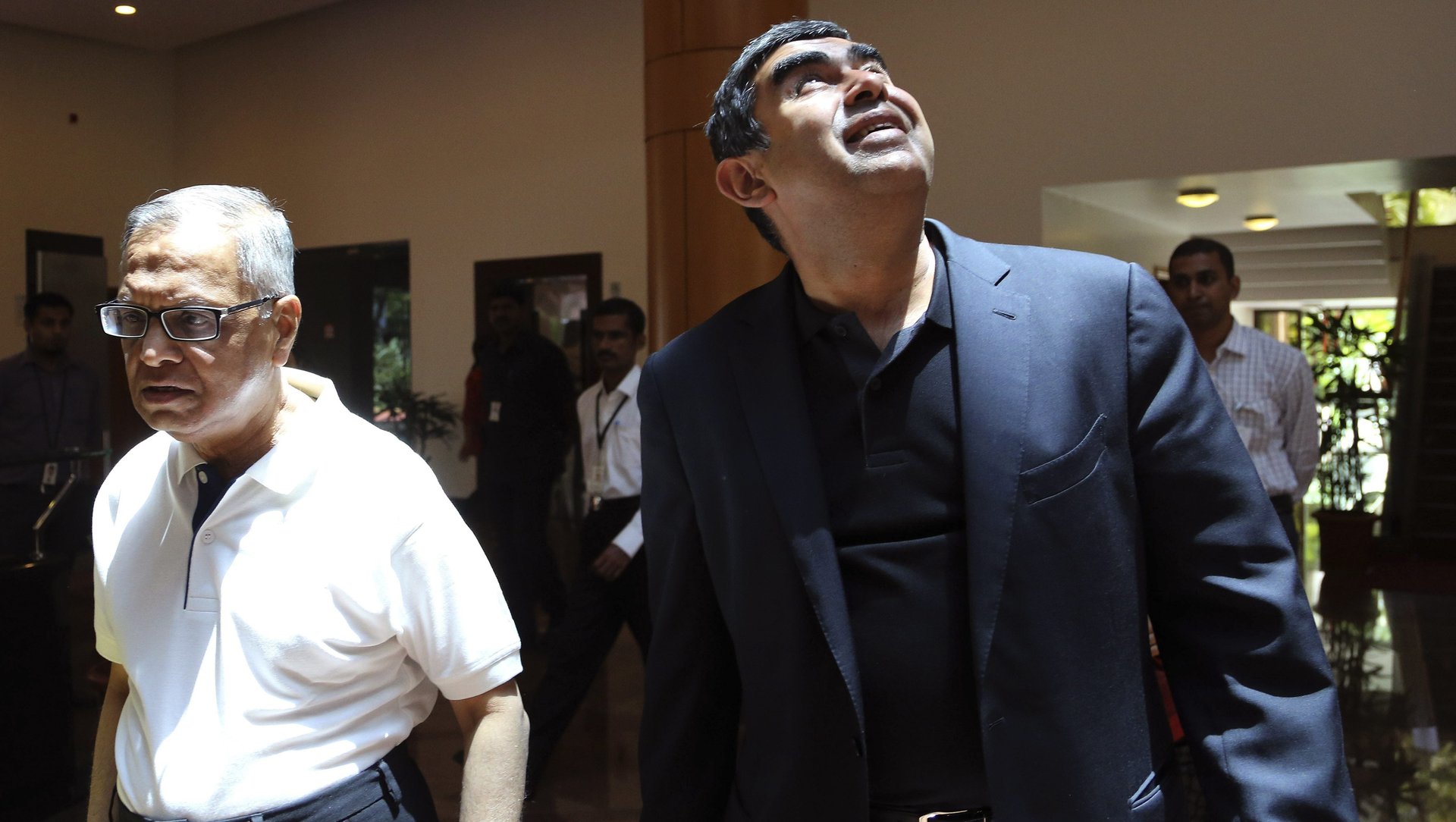Infosys is worried, and it shows
The last year has been a rocky ride for Infosys, India’s second largest IT company.


The last year has been a rocky ride for Infosys, India’s second largest IT company.
Like the rest of the country’s $150 billion IT industry, Infosys, too, has been coming to terms with changing immigration policies, visa provisions, and business demands in key markets. Two of Infosys’s cash cows—the US and the UK, where it generated over 61% and 22% of revenue, respectively—are in jeopardy. The uncertainty brought forth by Brexit and US president Donald Trump’s “Buy American, Hire American” policy is rattling confidence.
The strain is clearly showing in Infosys’s latest annual filing with the US Securities and Exchange Commission (SEC), where relatively vaguely worded risks from the past have taken more definitive shape. Alongside, there is now acknowledgement that an internal boardroom tussle and an onslaught of negative press can also take their toll.
The ticking visa bomb
In its latest SEC filing, Infosys recognises that governments are starting to act on anti-immigration sentiments. As the H-1B program, which allows people to work in the US for over six years, is revamped and other countries around the world start shutting the door on Indian techies, business will likely feel the heat.
It’s instructive to compare the change in language in 2017, compared to the company’s 2016 SEC filing. Some parts have been bolded for emphasis.
From 2016:
Anti-outsourcing legislation in certain countries in which we operate, including the United States and the United Kingdom, may restrict companies in those countries from outsourcing work to us, or may limit our ability to send our employees to certain client sites.
From 2017:
An increase in anti-outsourcing sentiments in certain countries in which we operate, including the United States and the United Kingdom, may lead to the enactment of restrictive legislations that could limit companies in those countries from outsourcing work to us, or could inhibit our ability to staff client projects in a timely manner thereby impacting our revenue and profitability.
The fear is real, and Infosys has already begun acting on it. In May, the Bengaluru-based firm announced that it’ll be hiring 10,000 American workers over the next two years.
Known enemy
For the first time, Infosys admitted that it is fighting a familiar yet unexpected beast: its own shareholders.
From 2017:
Actions of activist shareholders may adversely affect our ability to execute our strategic priorities, and could impact the trading value of our securities. Responding to actions by activist shareholders can divert the attention of our board of directors, management and our employees and disrupt our operations. Such activities could interfere with our ability to execute our strategic plan. This may also require us to incur significant legal fees and public relations costs. The perceived uncertainties as to our future direction could affect client and investor sentiment, resulting in volatility in the price of our securities.
The company did not name names. In fact, it even went to great lengths to stress that activist shareholders “does not refer to any particular group of investors or individuals,” according to a report in the newspaper Mint.
However, earlier this year, Infosys cofounders like NR Narayana Murthy and others publicly chastised the company’s current management, even raising allegations of poor governance. In February 2017, Murthy questioned the hefty compensation and severance packages doled out by the company, a concern he raised again in April.
Press-ing hard
The public airing of concerns by important stakeholders has inevitably created another risk factor: bad press. It’s something the company has recognised in the past, too, but the reference to inaccuracy is something new.
From 2016:
Media coverage and scrutiny of our business practices, policies and actions has increased dramatically over the past several years, particularly through the use of social media
From 2017:
Media coverage and public scrutiny of our business practices, policies and actions has increased dramatically over the past twelve months, particularly negative and in some cases, inaccurate posts or comments in the media, including through the use of social media.